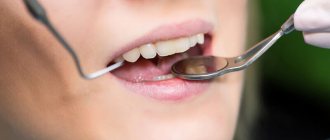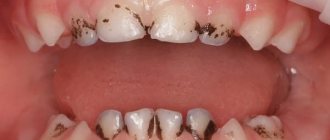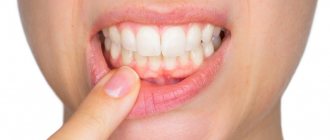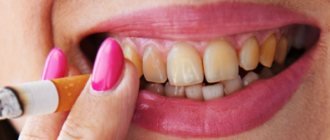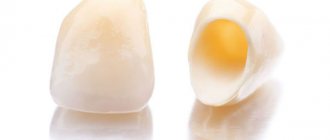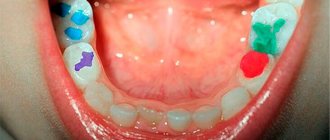What foods stain teeth?
- Coffee
. Lovers of this drink most often have a yellow or brownish coating on their teeth. This is due to the cocoa butter, heavy carbohydrates and sugars contained in coffee. Instant coffee has a greater effect on dental health than ground coffee.
enamel. You can reduce the effect of coffee on your teeth by diluting it with milk or water. It is also best to limit your coffee intake to one cup per day. - Tea
. Contains tannins and, like coffee, stains teeth a yellowish-brown tint. Tea in bags is most harmful to teeth: due to the artificial components contained in it, which happens very often, it stains teeth more than leaf tea. The type of tea - green or black - does not matter. - Wine
. White wine contains acids that negatively affect tooth enamel, causing microcracks to appear through which coloring substances penetrate deeper. Red wine contains tannins and a burgundy-red tint, which also contributes to tooth staining. - Carbonated drinks
. Not only do they change the color of your teeth, but they can also leach calcium from your teeth. In addition to a huge amount of sugar, they contain malic, citric and other acids that literally “corrode” the enamel. You should especially beware of colored soda - it not only corrodes the enamel, but can also stain the tongue and teeth in poisonous colors. If you decide to drink Coca-Cola, do it through a straw, this will reduce the harmful effects on your teeth. - Juices
. Bright and dark juices, such as pomegranate, cranberry, grapefruit, etc., due to their bright color, can also cause yellowing of teeth. It is healthier to simply eat fruit or drink juice diluted with water. - Vegetables and fruits
. Berries that are rich and dark in color, such as blueberries, blackberries, blueberries, cherries, and cranberries, can cause staining and yellowing of teeth. Among vegetables, beets are a strong dye due to the high content of chromogens in them. To prevent dark plaque from forming on your teeth, it is recommended to brush your teeth immediately after eating beets. - Sauces and seasonings
. Many seasonings that have a yellow or brown tint are also on the list of foods that stain teeth. Due to their bright color and high acid content, tomato-based sauces are harmful to teeth. Also, do not overuse soy sauce. - Chocolate and ice cream
. Chocolate and caramel from their color also lead to darkening of the enamel. As for ice cream, sweet and fruit desserts, they contain artificial food colors and chemical components that lead to microtrauma and staining of teeth.
To avoid staining and maintain the natural color and health of your teeth, we recommend visiting a dentist once every 6 months for professional oral hygiene.
You can make an appointment by phone. 8(863)2098902.
What are the benefits and harms of green tea?
The benefits of green tea have been proven in ancient times. Modern scientists confirm the beneficial properties of tea, but at the same time they also talk about its harm.
USEFUL COMPOSITION
The beneficial qualities of green tea are explained by the content of various substances in it. Tea contains more than 500(!) elements (calcium, magnesium, fluorine, phosphorus, etc.) and almost all groups of vitamins. Also, green tea benefits due to such components as:
CAFFEINE is the main alkaloid of green tea, thanks to which our body receives a surge of strength and a portion of vigor. But green tea does not contain caffeine in its pure form; here it is called theine. Theine has a milder effect than pure caffeine, it activates a person’s mental and physical activity, increases his performance, and lifts his mood.
MINERALS in green tea contribute to the normal functioning of all body systems. Maintaining the correct balance of minerals in the body is the key to strong immunity, healthy hair, nails, teeth, etc.
CAKHETINS are good antioxidants. The most powerful antioxidant of the four main tea cahetins is approximately 35-100 times stronger than vitamins
C and E. Just one cup of green tea a day is enough for this. to provide the body with 10-40 milligrams of antioxidants. Being a strong antioxidant, green tea reduces the likelihood of cancer.
SO WHAT IS THE BENEFIT?
- Green tea is an effective diaphoretic. It is recommended to drink it at elevated temperatures, fever, and various types of inflammation.
- It is especially useful for people suffering from diseases of the kidneys and genitourinary system, and also has a beneficial effect on the gastrointestinal tract and digestion in general.
- Drinking this tea has a positive effect on the functioning of the duodenum, gall bladder, liver and pancreas.
- It can increase attention and improve memory, can invigorate and relieve drowsiness, normalizes metabolism in the body and strengthens the nervous system, helps to get out of depression.
- The beneficial effects of green tea also extend to the cardiovascular system: the beneficial properties of green tea reduce the likelihood of atherosclerosis, improve the elasticity of the arteries, prevent the appearance of cholesterol plaques, increase the strength of capillaries, while the permeability of the walls of blood vessels is reduced and ascorbic acid is better absorbed.
- And he is also an excellent assistant for those who want to lose weight.
WHAT IS THE HARM?
Green tea is harmful to people suffering from nervous exhaustion. Caffeine, which is found in large quantities in green tea, stimulates the nervous system. In this regard, people suffering from nervous exhaustion may experience sleep disturbances and causeless loss of strength.
It is better not to drink green tea before bed at all, as there is a risk of insomnia. Green tea is not recommended for those who suffer from tachycardia, as well as increased excitability.
People with blood pressure problems can feel the harm of green tea. It often lowers blood pressure, so you should not drink it in large quantities if you have hypotension, and drinking green tea for acute hypertension is completely contraindicated.
If you have any chronic disease, then green tea should be drunk with caution, it can cause an exacerbation of the disease and worsen your health. For example, with peptic ulcers, drinking green tea can lead to increased acidity of gastric juice.
If you have gout, it is better not to drink green tea at all, as it is rich in purine bases!
HOW TO DRINK GREEN TEA CORRECTLY
Drinking green tea on an empty stomach is harmful, as it irritates the mucous membrane of even a healthy stomach. And if you drink green tea after eating, then on the contrary, it helps your digestion.
Green tea is much healthier if you drink it throughout the day rather than in the evening or at night. Drinking fresh green tea before bed, having a tonic effect, instead of the expected rest and sweet sleep, will give you a headache and fatigue.
Never alternate green tea with alcoholic drinks! This is a severe blow to your kidneys.
Do not take pills or other medications with green tea - it will remove all chemicals from the body, thereby reducing the effectiveness of the medications.
The harm of green tea may lie in its low-quality varieties. Try to find real, fresh green tea, not the poor version in cheap tea bags.
And remember the golden rule: EVERYTHING IS GOOD IN MODERATION. This also applies to green tea.
Store tea in tin jars with a tight-fitting lid, or better yet, in wooden boxes. Green tea cannot be stored in paper bags: they do not close tightly and allow moisture to pass through.
Head dept. 2nd t/o L.M. Dumpling
Methods
The study included 100,902 adults from China who participated in the Prediction for ASCVD Risk in China (China-PAR) program. All individuals included in the study had lived in 15 Chinese provinces since 1998.
Information on tea consumption was obtained from questionnaires. Based on the amount of tea consumed per week, 2 groups were divided: drinking tea 3 or more times a week (habitual consumers) and never or rarely drinking tea (less than 3 times a week).
The researchers performed regression analyzes and calculated hazard ratios for atherosclerotic cardiovascular events and death.
Useful video
From this video you will learn how long after you can eat and drink after tooth extraction:
Tea is considered the safest drink for teeth, since only its excessive consumption can lead to negative consequences in the form of discoloration of tooth enamel.
When purchasing a product, it is recommended to take into account its composition and duration of storage , since flavors and fruits in the composition have a different effect on the teeth, and the storage time of the product contributes to the accumulation of fluoride compounds in tea leaves.
Relevance
Tea can truly be called the national Russian drink.
Studies evaluating the effect of drinking tea as primary cardiovascular prevention are limited.
The authors of a new prospective cohort study assessed the association between tea consumption and the risk of atherosclerotic cardiovascular disease and overall mortality.
results
- During a mean follow-up period of 7.3 years, 3683 atherosclerotic cardiovascular events, 1477 deaths due to atherosclerotic cardiovascular causes, and 5479 deaths from any cause occurred.
- Compared with those who never or rarely drank tea, drinking tea 3 or more times per week was associated with a 20% reduction in the risk of atherosclerotic cardiovascular events (hazard ratio, 0.80 (0.75–0.87)), death for atherosclerotic cardiovascular causes by 22% (hazard ratio, 0.78 (0.69–0.88), and all-cause death by 15% (hazard ratio, 0.85 (0.79–0.90).
- Tea drinkers had a 1.4 year longer period of life without atherosclerotic cardiovascular events.
- This association was stronger for study participants who drank tea 3 or more times throughout the observation period.
- Note that the association between tea consumption and cardiovascular events was observed for green tea, but not for black tea.
Common questions about the properties of tea drinks
Is it possible to drink tea after tooth extraction?
Attention! Dentists do not recommend eating or drinking for 2 to 3 hours after tooth extraction due to the healing of the socket.
After this time, it is recommended to drink only cold drinks, since hot liquid can cause bleeding from the socket of an extracted tooth .
Does green tea protect your teeth?
Japanese dentists have found that this drink helps strengthen enamel and protect gums thanks to a large amount of fluoride and cahetin.
The components of the drink have anti-inflammatory and bactericidal properties , which prevents premature tooth loss.
Does green tea stain teeth?
Cosmetic dentists believe that excessive consumption of green tea can change the natural color of the enamel and turn it yellowish .
Important! The fact that teeth turn yellow is due to the high content of tannins, which enhance the coloring properties of the components.
To maintain a white smile, it is not recommended to drink the drink in excessive quantities.
Tea after filling
Depending on the filling technology and the composition of the material used, the filling can harden within several hours after the procedure or harden under the light of a special lamp immediately after installation. The danger of drinking tea after filling is the risk of staining the filling yellow or brown .
An amalgam filling
should not be exposed to dyes for 1–2 days , since during this time it undergoes a polymerization process.
Lamp treatment is typical for ceramic fillings.
This technology allows you to achieve the desired filling result without waiting and consume liquids and food almost immediately after the procedure.
Note! You should not drink hot drinks, as the new filling may become damaged and begin to crack under the influence of temperature.
Can tea whiten teeth?
Whitening properties are characteristic only of green and white teas , since, along with fluorine content, they contain practically no coloring molecules.
Tea after whitening
Dentists recommend abstaining from food and drinks for two hours after completing the whitening procedure.
After this period, the patient must go on a “White Diet” for up to two weeks.
The principle of the diet is to consume white foods or those that do not contain dyes in their composition.
At this time, only green and white teas are allowed to be consumed in small quantities.
Tea during teething
Teething is always accompanied by an inflammatory process. The antibacterial and anti-inflammatory properties of tea can facilitate the teething process and protect the child from oral infections .

